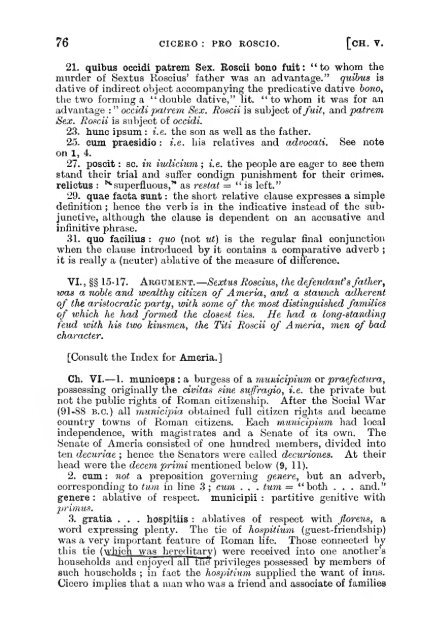Pro S. Roscio Amerino
Pro S. Roscio Amerino
Pro S. Roscio Amerino
You also want an ePaper? Increase the reach of your titles
YUMPU automatically turns print PDFs into web optimized ePapers that Google loves.
76 CICERO : PKO ROSCIO. [CH. V.<br />
21. quibus occidi patrem Sex. Roscii bono fuit: "to whom the<br />
murder of Sextus Roscius' father was an advantage." qtdbus is<br />
dative of indirect object accompanying the predicative dative bono,<br />
the two forming a " double dative," lit. " to whom it was for an<br />
advantage : " occidi patrem Sex. Boscii is subject olfuit, and patrem<br />
Sex. Roscii is subject of occidi.<br />
23. hunc ipsum : i.e. the son as well as the father.<br />
25. cum praesidio : i.e. his relatives and advocati. See note<br />
on 1, 4.<br />
27. poscit : sc. iii iudicijim ; i. e. the people are eager to see them<br />
stand their trial and suffer condign punishment for their crimes.<br />
relictus : "^ superfluaus," as restat = " is left."<br />
29. quae facta sunt : the short relative clause expresses a simple<br />
definition ; hence the verb is in the indicative instead of the subjunctive,<br />
although the olause is dependent on an accusative and<br />
infinitive phrase.<br />
31. quo facilius : quo (not ut) is the regular final conjuuction<br />
when the clause introduced by it eontains a comparative adverb ;<br />
it is really a (neuter) ablative of the measure of difference.<br />
VI., §§ 15-17. Argument.—Sextus Roscius, the defendanfsfatlier,<br />
was a noble and wealthy citizen of Ameria, and a staunch adherent<br />
of the aristocratic party, wilh some of the most distinguished families<br />
of which he had formed the closest iies. He had a long-standing<br />
feud with his two lcinsmen, the Titi Roscii of Ameria, men of bad<br />
character.<br />
[Consult the Index for Ameria.]<br />
Ch. VI.— 1. municeps : a hurgesa of a, rnuiiicipium or praefectura,<br />
possessing originally the civitas sine sujfragio, i.e. the private but<br />
not the public rights of Roman citizenship. After the Social War<br />
(91-88 B.c. ) all vmnicipia obtained fuU citizen rights and became<br />
country towns of Roman citizens. Each rnunicipium had local<br />
independence, with magistrates and a Senate of its own. The<br />
Senate of Ameria consisted of one hundred members, divided into<br />
ten decuriae ; hence the Senators were called decurioiies. At their<br />
head were the decem primi mentioned below (9, 11).<br />
2. cum : not a preposition governing genere, but an adverb,<br />
corresponding to tum in line 3 ; cum . . . tum = "both . . . and."<br />
genere : ablative of respect. municipii : partitive genitive with<br />
primus.<br />
3. gratia . . . hospitiis : ablatives of respect with florens, a<br />
word expressing plenty. The tie of hospitium (guest-friendship)<br />
was a very important feature of Roman life. Those connected by<br />
this tie ( which was hereditarv ) were received into one another's<br />
households and enjoyed ali tliel privileges possessed by members of<br />
such households ; in fact the hospitium supplied the want of inns.<br />
Cicero implies that a man who was a friend and associate of families

















